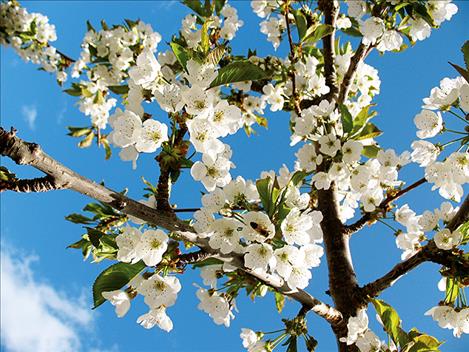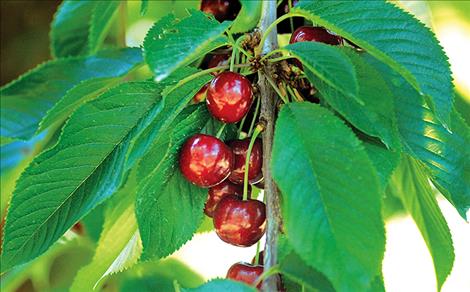Flathead cherry crop expected to be later this season
Hey savvy news reader! Thanks for choosing local.
You are now reading
1 of 3 free articles.
YELLOW BAY – The Community Clubhouse was full of talk about soil health, bud size and harvest dates at the Flathead Cherry Growers co-operative meeting.
According to Bruce Johnson, President of the co-op’s board of directors, the event serves as a springboard for the coming season. Growers learn from specialists who speak at the event. They also look at how the growing season is going in Washington, which is a good indicator of what this year’s cherries will look like.
Johnson said cherry growth will be a bit behind schedule this year, but overall the prognosis for the growing season looks good. Abnormally cold temperatures in February worried growers but didn’t have a significant negative impact on growth.
In Washington the growing season has been successful, but a bit behind schedule, Johnson said. Flathead growers will likely see similar conditions. Normally, cherry growers start picking in mid July. This year it will likely be later.
A later crop could actually benefit Flathead cherry growers, Johnson said. Cherries are easier to sell later in the season, when warmer regions of the country are no longer producing fruit. “We try to distance ourselves from the Washington crop,” he said.
The Flathead Lake Cherry Growers co-operative has facilitated the event since its start in 1937. There are about 70 members of the co-op today, Johnson said. The co-op allows small growers to combine their crops to serve larger markets than they could individually. This increases profits and makes selling on a large scale possible for family orchards. Cherries are an anomaly in colder parts of the country. Flathead Lake keeps the temperatures warmer in winter, which allows cherries to flourish.
The co-op also serves an educational purpose, bringing new ideas into the area through presentations like those at the meeting. This year, the meeting featured a specialist who spoke about building healthy soil to promote healthy tree growth. Dr. David Granatstein is a sustainable agriculture specialist at Washington State University. Johnson said improving soil could have a big impact on the success of a cherry tree. “Probably the most important part of tree growth is what’s going on in the soil,” he said.
Next, the group saw a presentation from Brian Campbell. Campbell has an orchard on Finley Point and serves as the Flathead field man for Monson Fruit Company. Many cherry growers sell their fruit to Monson. Campbell highlighted a number of innovative growing techniques being used in local orchards.
One recent change in the Flathead cherry industry was spurred by the opening of Tabletree Juice, a craft cherry juice company in Bigfork. The company began working with Flathead growers in 2016. Tabletree juice buys “cull” cherries that are split or bruised and makes them into pure cherry juice. The juice is sold at grocery stores. The opportunity has allowed growers to cover the cost of growing and harvesting cherries that otherwise would have been wasted. “We’ve been able to make money from essentially our bad cherries,” Johnson said.
Year after year, working together to grow and market cherries from the shores of Flathead Lake is a tradition for the growers’ co-op. “Someone has been growing cherries here for a long time,” Johnson said.

















